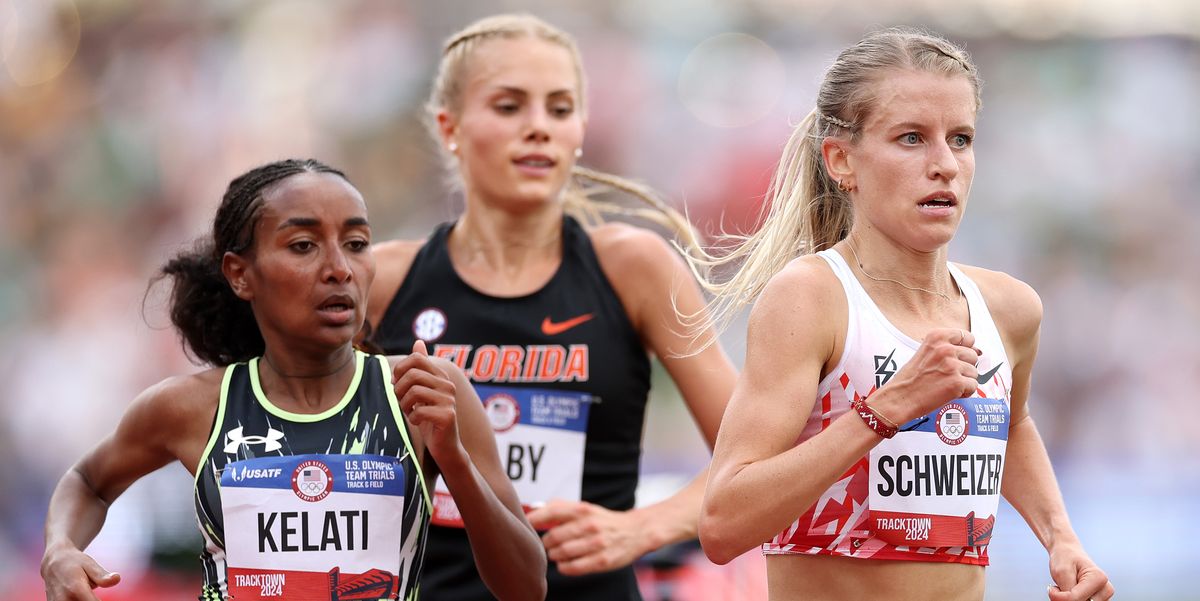
WHO WILL MAKE TEAM USA IN THE WOMEN’S 10,000 METERS?
Weini Kelati, who’s already the American record holder in the half marathon, can now add another accolade to her impressive resume: Olympian. The 27-year-old won the women’s 10,000 meters in 31:41.07 and will represent the United States in Paris.
Parker Valby, 21, the six-time NCAA champion, placed second in 31:41.56. And Karissa Schweizer, 28, who’d already made the team in the 5,000 meters on Monday, was third in 31:41.56. Yet despite their podium finishes, it isn’t yet clear whether they will be named to the Olympic team.
That’s because Kelati was the only person who entered the race having achieved the automatic Olympic qualifying standard of 30:40, a time faster than any woman ran tonight. But there’s another way to qualify—via World Athletics rankings. And though the answer won’t be definitive until July 7, Valby and Schweizer do still stand a strong chance of becoming Olympians in this event.
Why? As we’ve explained before, each athlete is assigned a performance score for each qualifying race based on their finishing time and place. Then, their top two scores are averaged together to calculate their ranking score. Based on the results of tonight’s race, Valby’s ranking score will increase from 1,161 to 1,213, and Schweizer’s from 1,182 to 1,209.
Currently, they’d need a score of 1,236 to move high enough in the rankings to earn a spot. But some of the athletes ahead of them on the list won’t compete, including American Alicia Monson, who tore her meniscus in April. That will bring the number of required points down—and could earn Schweizer and Valby their spots on Team USA.
The race got off to a relatively slow start; Susanna Sullivan took the lead about a lap in, and held it through 6400 meters. But after several 79- to 80-second laps, Erika Kemp surged to the front, quickening the pace and pulling a pack of about six—including Kelati, Valby, and Schweizer—along with her.
With five laps to go, Valby made a decisive move to the front, pushing the pace to her trademark 71 seconds per lap. Unlike in the 5,000 meters, she planned to save energy by not taking the lead early and instead waiting for a cue from her coach, Will Palmer, she told reporters after the race. “I just looked at him every lap and when he said to go I went, and it worked,” she said.
Schweizer and Kelati stayed close, and the three quickly dropped the rest of the field. Seconds before the bell, Schweizer surged ahead. With about 200 meters to go, Kelati made what looked like a final move to the front. Shortly afterward, Schweizer—and, almost, Valby—passed her again, and it appeared Kelati would settle for second or third. Still, it wasn’t over: in the final 80 meters, Kelati sprinted past Schweizer on the inside to claim the win.
Kelati, an Eritrean native, said afterward she gets emotional each time she returns to Eugene—it was after a race here when, in 2014, she decided not to board her plane home and instead seek asylum. Tonight, she calmed herself by focusing not on the past, but the present.
Looking to the future, she predicts a strong performance in Paris. “For me, I get more competitive in the international level than in the championship races,” she said. “I’m pretty happy to make the team right now, but I feel like I’m going to have the best race out there.”
Jess McClain—who took a break from professional running but returned with a vengeance to place fourth at the Olympic Marathon Trials—once again finished fourth, in a time of 32:04.57. And once again, she was more proud than disappointed, saying tonight’s strong finish rewrote some of her less-than-stellar memories of track racing.
“With the marathon, I was so stoked to run the time I did, and today I was so stoked to get fourth,” she said. “This was just the cherry on top of a great year and I’m more motivated than ever to get back to marathon pace now.”
2024-06-30T03:53:21Z dg43tfdfdgfd